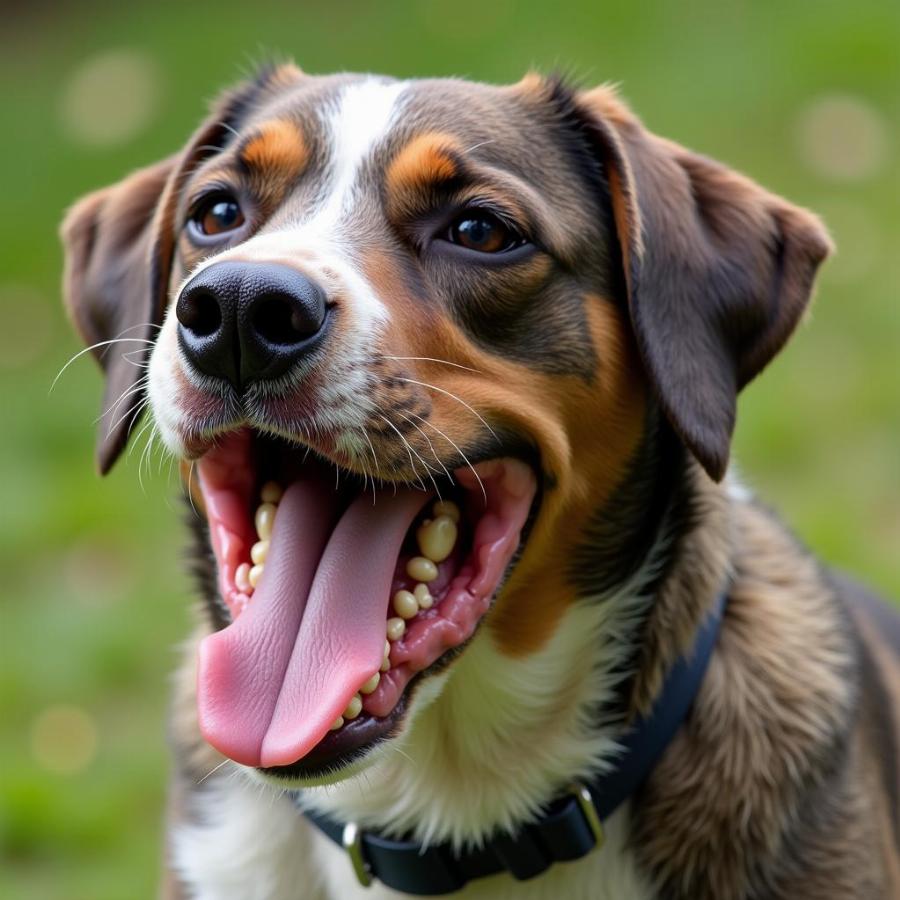Rabies is a deadly virus that can infect any mammal, including our beloved canine companions. While vaccination significantly reduces the risk, can a vaccinated dog still get rabies? Understanding this crucial question is vital for every responsible dog owner.
Understanding Rabies Vaccination in Dogs
Rabies vaccines don’t offer 100% immunity. Though rare, there’s a small chance a vaccinated dog can contract rabies. This could happen if the vaccine wasn’t administered correctly, if the dog’s immune system didn’t respond properly, or if the dog was exposed to a particularly potent strain of the virus. It’s important to understand how these factors influence your dog’s protection against this devastating disease.
How Rabies Vaccines Work
Rabies vaccines work by introducing a weakened or killed version of the rabies virus into your dog’s system. This prompts the dog’s immune system to produce antibodies that can fight off the virus if it encounters it in the future. This process, however, relies on a healthy and responsive immune system.
Factors Affecting Vaccine Effectiveness
Several factors can impact how effectively a rabies vaccine protects your dog. These include the dog’s age, overall health, and whether or not they received the full series of initial vaccinations and subsequent boosters. A puppy with an underdeveloped immune system, for example, may not respond as strongly to the vaccine as an adult dog. Similarly, a dog with a compromised immune system due to illness or other factors may also have reduced protection.
Signs of Rabies in Vaccinated Dogs
While the chances are slim, if a vaccinated dog contracts rabies, the signs are the same as in unvaccinated dogs. These include behavioral changes (aggression, anxiety, excessive salivation), difficulty swallowing, paralysis, and ultimately, death. Early detection is critical.
What to Do if You Suspect Rabies
If your dog exhibits any potential rabies symptoms, immediately contact your veterinarian. Even if your dog is vaccinated, it’s essential to err on the side of caution and seek professional medical advice. Your vet will perform a thorough examination and likely recommend further testing.
 Dog showing symptoms of illness, potentially rabies.
Dog showing symptoms of illness, potentially rabies.
Preventing Rabies in Vaccinated Dogs
While no vaccine is foolproof, there are several steps you can take to minimize the risk of your vaccinated dog contracting rabies:
- Ensure your dog receives the complete rabies vaccination series and boosters as recommended by your veterinarian. This establishes and maintains a robust immune response.
- Avoid contact with wildlife. This includes keeping your dog on a leash during walks and preventing them from roaming freely in areas where wildlife is common.
- Report any bites from unknown animals to your veterinarian and local animal control. This helps track potential rabies exposures and protect both animals and humans in your community.
Can Rabies be Transmitted from a Vaccinated Dog to Humans?
Although incredibly rare, theoretically, a vaccinated dog that contracts rabies could transmit the virus to a human through a bite. This is why it’s crucial to seek immediate medical attention if bitten by any dog showing signs of rabies, regardless of its vaccination status.
Conclusion
While vaccination greatly reduces the risk, a vaccinated dog can still get rabies, though incredibly rare. Maintaining regular vaccinations, avoiding wildlife contact, and seeking immediate veterinary attention for any suspicious symptoms are crucial for protecting both your dog and your family from this deadly virus.
FAQ
- How often should my dog receive a rabies booster? This depends on local regulations and your veterinarian’s recommendations. Typically, boosters are given every one to three years.
- Is the rabies vaccine 100% effective? No vaccine is 100% effective, but the rabies vaccine is highly effective when administered correctly and boosted appropriately.
- Can indoor dogs get rabies? While less likely, indoor dogs can still be exposed to rabies through contact with bats or other wildlife that may enter the home.
- What is the incubation period for rabies in dogs? The incubation period, the time between exposure and the onset of symptoms, can vary from a few weeks to several months.
- What happens if my dog bites someone and isn’t up to date on their rabies vaccine? Your dog may be quarantined for observation or even euthanized, depending on local regulations.
Further Reading
For more information, you can also check out our articles on pa dog warden, franklin county dog licensing, and how to tell if my dog has rabies. These provide valuable insights into dog ownership regulations and rabies identification. We also have articles on tractor supply dog vaccine schedule and dog rabies tag for additional information about vaccinations and identification.
Beaut Dogs is your trusted source for all things canine. We provide expert advice and valuable resources for dog lovers everywhere. For further assistance or clarification, please contact us at Email: [email protected] for detailed and accurate answers from Beaut Dogs.